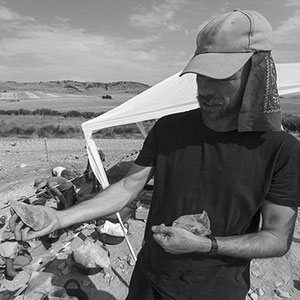
Origin and cultural evolution of Homo erectus in East Africa (Human Paleontology)
The transition from Olduvayan to Acheulean and its relationship to the evolution of Homo habilis to Homo erectus is one of the most debated topics in modern Paleoanthropology. The Acheulean was the first human culture to spread widely throughout the Old World and lasted for 1.5 million years, but the biological and cultural processes that led to the emergence of Acheulean are still not well understood. This research will gather to reconstruct the paleoecological background and subsistence strategies of the first Achellenic hominids.

Period
Lower and Middle Pleistocene (between 1.9 and 0.15 million years)
Institution
Institute of History, Consejo Superior de Investigaciones Científicas.
Web and social networks
Location
PRINCIPAL RESEARCHERS

Ignacio de la Torre
Ignacio de la Torre was a predoctoral fellow at the Department of Prehistory of Consejo Superior de Investigaciones Científicas (CSIC) and received his PhD from the Complutense University of Madrid in 2005. In the same year he obtained a tenured professorship at the Institute of Archaeology at University College London (UCL). Between 2012 and 2016 he was the Principal Investigator of an ERC- Starting Grant (https://cordis.europa.eu/project/id/283366) at the same Institute of Archaeology of UCL, where he held since 2015 the Chair of Palaeolithic Archaeology, and where he now holds a position as Honorary Professor of Palaeolithic Archaeology (https://www.ucl.ac.uk/archaeology/people/ignacio-de-la-torre-professor-palaeolithic-archaeology), after his recent incorporation to the Department of Archaeology and Social Processes of the Institute of History-CSIC, where he is currently the PI of an ERC- Advanced Grant (https://cordis.europa.eu/project/id/832980).
RESULTS
The African Rift Valley has the longest and most continuous archaeological sequence of the entire Lower and Middle Pleistocene in the world. The research that the PI has conducted in Ethiopia and Tanzania (de la Torre et al., eds, 2018) in recent years has established the empirical, methodological and logistical basis for developing a long-term research project focused on the ecological, cultural and adaptive dynamics of the hominids that occupied the region between 1.7 and 0.2 million years.
- To continue the consolidation of this line of research in a paleoecological and archaeological sequence for the Lower Pleistocene that serves as a reference to compare the world record belonging to this period.
- Multidisciplinary approach to the archaeological record, which includes from the regional to the microscopic scale, the systematic use of GIS tools, the detailed analysis of the formation processes of the sites and the integral study of the associated geological and paleoecological contexts.
- Innovative character in field and laboratory methodologies. This element of methodological innovation has become an international reference in recent years, and it is hoped that in the future we will continue to explore the digital and spatial tools that are currently being promoted in our lines of research.
Together with these components of methodological innovation, the originality of our proposal includes a transversal perspective in the study of the societies of the Lower Palaeolithic.
PICTURES
- Bite marks confirm gladiators fought lions at York (Heritage Daily 23/04/2025) - 24 April, 2025
- Ancient DNA challenges long-held assumptions about the Mediterranean Phoenician-Punic civilization (Phys.org 23/04/2025) - 24 April, 2025
- Neolithic agricultural revolution linked to climate-driven wildfires and soil erosion (Phys.org 22/04/2025) - 23 April, 2025









